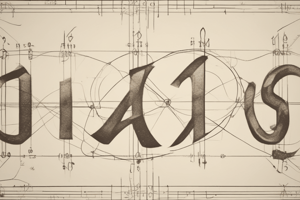Podcast
Questions and Answers
Which number system includes whole positive integers like 1, 2, 3...?
Which number system includes whole positive integers like 1, 2, 3...?
What is the main characteristic of integer numbers compared to natural numbers?
What is the main characteristic of integer numbers compared to natural numbers?
Which number system allows representing quantities without loss due to zero crossings?
Which number system allows representing quantities without loss due to zero crossings?
What defines a rational number?
What defines a rational number?
Signup and view all the answers
Which number system involves fractions such as
(rac{1}{2}),
(rac{-7}{2}), and integers like
(rac{
ext{sqrt}(9)}{3})?
Which number system involves fractions such as (rac{1}{2}), (rac{-7}{2}), and integers like (rac{ ext{sqrt}(9)}{3})?
Signup and view all the answers
Which number system is the most abstract compared to integers?
Which number system is the most abstract compared to integers?
Signup and view all the answers
What distinguishes irrational numbers from rational numbers?
What distinguishes irrational numbers from rational numbers?
Signup and view all the answers
Why are real numbers considered complete?
Why are real numbers considered complete?
Signup and view all the answers
What essential property do real numbers possess in relation to order?
What essential property do real numbers possess in relation to order?
Signup and view all the answers
Why are rational numbers considered countable?
Why are rational numbers considered countable?
Signup and view all the answers
What does the concept of real numbers allow us to do with decimals?
What does the concept of real numbers allow us to do with decimals?
Signup and view all the answers
How do irrational numbers like Pi ( ( extpi) and Euler's constant (e) differ from rational numbers?
How do irrational numbers like Pi ( ( extpi) and Euler's constant (e) differ from rational numbers?
Signup and view all the answers
Study Notes
Exploring Math's Foundations: Number Systems
We all encounter numbers daily—on clocks, receipts, and calculators. But have you ever stopped to wonder where these numerical tools originated from? In this journey into mathematics' foundations, we'll dive into its fundamental building blocks — number systems.
Natural Numbers ((\mathbb{N}))
Our mathematical odyssey begins with natural numbers; whole positive integers like 1, 2, 3, ... These form our first intuitive understanding of counting. We assign each unique item one unit, two units for pairs, three units for triplets, etc.
Integer Numbers ((\mathbb{Z}))
Negatives join positives when introducing integer numbers, extending our collection downwards by including negative whole numbers such as -1, -2, -3... This addition permits us to represent quantities without loss due to zero crossings, allowing comparisons like (5 > 3) or (8 < 4).
Rational Numbers ((\mathbb{Q}))
The division operation provides another extension to integers, creating rational numbers. A fraction is defined as any number expressible as (\frac{a}{b}), where (a) and (b) are both integers, and (b \neq 0). For example, (\frac{1}{2}), (\sqrt{9} = 3), and (-\frac{7}{2}) are all considered rationals because they can be expressed as fractions involving only integers.
Rational numbers embody more abstract concepts compared to integers. They introduce new properties, such as decimal expansion approximation for irrational fractions like (\pi) or (e). Despite their complexity, though, rational numbers remain countable since every distinct ratio between integers belongs uniquely to their set.
Real Numbers ((\mathbb{R}))
Real numbers encompass both integers and rationals while also incorporating additional entities known as irrational numbers. Irrationals are real numbers that cannot be represented precisely as fractions. Examples include (\pi) (Pi) and Euler's constant ((e)), which possess non-repeating decimal expansions—though approximations come closer yet never coincide exactly within the sequence.
The concept of reals buoys the foundation of modern algebraic expressions and geometric analysis. It allows us to perform calculations with decimals, representing measurement values accurately using infinite precision approximations rather than limited rounding.
One fascinating property of real numbers concerns order relations among them: given any pair of real numbers, either one is less than, equal to, or greater than the other. Real numbers' completeness implies that there exist no gaps inside the continuum of real numbers. Every subset having an upper bound has a supremum (least upper bound).
In summary, mastery over basic number systems lays essential groundwork in understating complex mathematical theories. Each representation extends our comprehension beyond crude counting principles towards numerical abstraction, enabling intricate computations through precise quantification.
Studying That Suits You
Use AI to generate personalized quizzes and flashcards to suit your learning preferences.
Description
Delve into the origins and properties of natural, integer, rational, and real numbers as fundamental building blocks of mathematics. Learn about the distinctions and relationships among these number systems, from whole positive integers to real numbers encompassing both rational and irrational fractions.




